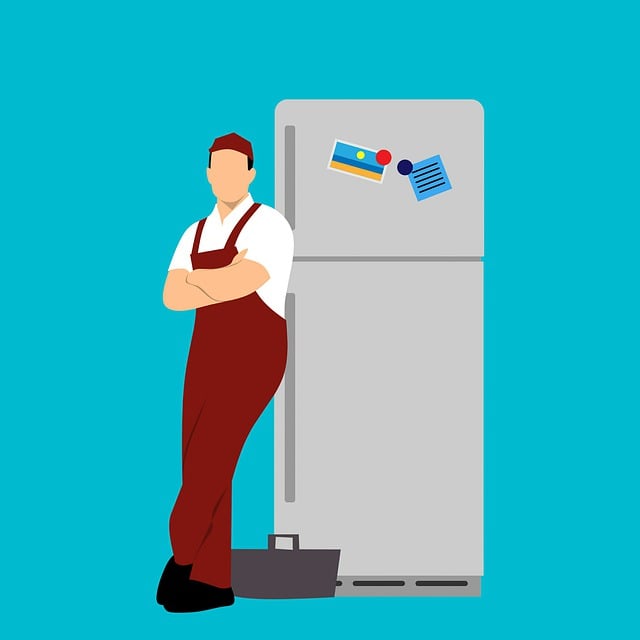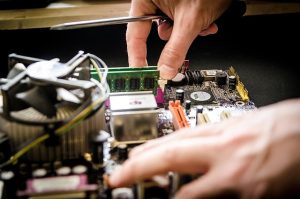Regularly cleaning your refrigerator's evaporator and condenser coils is a critical aspect of maintenance to ensure optimal performance and longevity. Dust and debris can accumulate on these coils over time, leading to decreased efficiency, higher energy bills, and potential system failures if left unchecked. A thorough coil cleaning involves unplugging the refrigerator, gently removing surface dirt with a soft brush or vacuum attachment, and using a mild detergent solution for deeper cleaning, followed by a rinse and complete drying before reconnecting power. This bi-annual task helps prevent energy waste and costly repairs, keeping your food chilled efficiently. For those who prefer professional assistance, refrigerator repair services are available to perform this maintenance safely and effectively, ensuring that your appliance continues to function correctly for years to come. Remember, the health of your refrigerator is closely tied to the cleanliness of its coils; regular upkeep is key to avoiding unexpected breakdowns and maintaining a consistently cold environment for your perishables.
Maintaining a refrigerator’s optimal performance hinges on regular maintenance, with evaporator and condenser coil cleaning playing a pivotal role. This article delves into the necessity of cleaning these coils for enhanced refrigerator efficiency, offering clear signs to watch for that signal a needed upkeep. We provide a meticulous, step-by-step guide for safe and effective cleaning, compare professional services against DIY options for refrigerator repair, and conclude with tips for sustaining peak performance post-cleaning. By understanding and implementing these best practices, you can extend your appliance’s lifespan and ensure it operates at its best.
- Understanding the Importance of Evaporator and Condenser Coil Cleaning for Refrigerator Efficiency
- Identifying Signs That Indicate Your Coils Need Cleaning
- Step-by-Step Guide to Safely Cleaning Your Refrigerator's Evaporator and Condenser Coils
- Professional vs DIY Coil Cleaning: Weighing Your Options for Refrigerator Repair
- Maintaining Optimal Performance After Coil Cleaning: Tips and Best Practices for Long-Term Refrigerator Care
Understanding the Importance of Evaporator and Condenser Coil Cleaning for Refrigerator Efficiency

Regular maintenance is key to maintaining optimal performance for any refrigerator, and one critical component that requires attention is the evaporator and condenser coils. These coils play a pivotal role in the refrigeration cycle by facilitating heat exchange. Over time, dust, pet hair, and debris can accumulate around these coils, significantly impacting their ability to function efficiently. The result? A refrigerator that works harder to maintain temperature, leading to increased energy consumption and potentially higher utility bills. Moreover, a dirty condenser or evaporator coil can cause the system to freeze over, which not only affects the unit’s performance but also poses a risk for refrigerator repair due to the strain on its components. Cleaning these coils is not a complex task but is essential for ensuring the longevity and reliability of your refrigerator. It’s a preventative measure that can save homeowners from costly refrigerator repairs and keep their food properly chilled or frozen, thereby safeguarding both the appliance and the freshness of the stored items. To effectively clean the coils, it’s advisable to follow the manufacturer’s guidelines or consider professional refrigerator repair services for assistance. By doing so, you can ensure that your refrigerator operates at peak efficiency, saving energy and reducing the likelihood of unexpected breakdowns.
Identifying Signs That Indicate Your Coils Need Cleaning

When your refrigerator is underperforming, there are several signs that may indicate your evaporator and condenser coils require cleaning. A sudden increase in energy consumption, despite consistent usage patterns, can be an early warning. Dirty coils force the refrigerator to work harder to maintain the desired temperature, leading to higher electricity bills. Another indicator is a refrigerator that’s not cooling as effectively as it used to. If you notice your food is warm or taking longer to chill or freeze, this is often a symptom of restricted airflow due to accumulated dust and debris on the coils. Over time, as the coils become increasingly covered with dirt, they can develop ice build-up on both the evaporator and condenser. This frost can insulate the coils, further impeding their ability to exchange heat efficiently. Regular cleaning of these coils by a professional during refrigerator repair services can prevent such issues and ensure your appliance operates at peak performance, keeping your food fresh and your energy costs in check. Homeowners should be vigilant about these signs and consider scheduling routine maintenance to avoid more costly repairs down the line.
Step-by-Step Guide to Safely Cleaning Your Refrigerator's Evaporator and Condenser Coils

Regular cleaning of your refrigerator’s evaporator and condenser coils is a critical aspect of maintaining optimal performance and ensuring long-term reliability. A buildup of dust, pet hair, and food particles on these coils can significantly impair the efficiency of your refrigerator, leading to increased energy consumption and potential failure. To safely clean these coils, follow these step-by-step instructions:
Begin by unplugging your refrigerator from the electrical outlet for safety reasons. This will prevent any risk of electric shock while you’re cleaning. Next, locate the evaporator coil, typically found at the back of the freezer compartment. Using a soft brush or vacuum with a crevice tool, gently remove any loose dirt or debris from around the coil. Be cautious not to bend or damage the fins during this process.
Once the exterior has been cleaned, prepare a mixture of warm water and a small amount of gentle detergent. Dip a soft cloth or sponge into this solution, wring it out well to avoid excess moisture, and then carefully clean the coils. Avoid using sharp objects or abrasive materials that could scratch the surface of the coil. After cleaning, rinse the coils with a damp cloth to remove any soap residue. Finally, ensure the area is completely dry before plugging your refrigerator back in. For harder-to-reach areas, consider using a coil brush designed specifically for this purpose. Regular maintenance every six months will help keep your refrigerator running efficiently and prolong its lifespan. If you encounter any issues during cleaning or if you require professional assistance, refrigerator repair services are available to address any concerns.
Professional vs DIY Coil Cleaning: Weighing Your Options for Refrigerator Repair

When considering refrigerator repair, maintaining the evaporator and condenser coils is crucial for optimal performance. These coils are integral to the refrigeration cycle, facilitating heat exchange processes that keep your refrigerator operating efficiently. Over time, dust, dirt, and grime can accumulate on these coils, impairing their function and leading to reduced cooling capacity or even complete system failure. To address this issue, homeowners face a choice between professional coil cleaning services and do-it-yourself (DIY) methods.
Professional cleaning services offer expert knowledge and specialized tools, ensuring thorough and safe cleaning of your refrigerator’s coils. Technicians are trained to handle the chemicals and procedures necessary for this task without causing damage to the appliance. This professional approach can prevent costly repairs or early replacement of your unit by restoring its efficiency and longevity. On the other hand, DIY coil cleaning is an option for those who prefer a more hands-on approach. It typically involves less expense but requires careful attention to safety and detail. Using solutions like a mixture of water and baking soda or a commercial coil cleaner, homeowners can attempt to clean the coils themselves. However, this method may not provide the same level of deep cleaning as a professional service, potentially leading to suboptimal performance if not done correctly. Ultimately, the decision between professional and DIY refrigerator repair for coil cleaning depends on your comfort level with appliance maintenance, the specific issues at hand, and your budget. Regardless of the path you choose, regular maintenance of your refrigerator’s evaporator and condenser coils is essential for maintaining its performance and ensuring it operates safely and efficiently.
Maintaining Optimal Performance After Coil Cleaning: Tips and Best Practices for Long-Term Refrigerator Care

Maintaining optimal performance after cleaning the evaporator and condenser coils in your refrigerator is crucial for ensuring its longevity and efficiency. Coil cleaning, a common refrigerator repair task, should be complemented by regular maintenance practices. Firstly, after coil cleaning, it’s important to inspect the coils to ensure they are properly aligned and not obstructed by dust or debris post-cleaning. This can prevent any future issues that might arise from poor airflow. Additionally, checking for refrigerant leaks is a step that should not be overlooked as part of the maintenance routine. Adequate refrigerant levels are vital for maintaining consistent temperatures within the appliance.
For long-term care, it’s advisable to regularly inspect and clean the coils every six months to a year, depending on usage. This frequency can vary based on the environment where the refrigerator is installed—for instance, in areas with higher dust levels or more humid conditions. Beyond coil cleaning, maintaining optimal performance involves keeping the surrounding area of the refrigerator clear of clutter and ensuring that air vents are unobstructed to allow for proper ventilation. Furthermore, regularly checking door seals for wear and tear can prevent warm air from infiltrating the unit, which is a common source of inefficiency. By following these best practices and enlisting professional refrigerator repair services when necessary, you can extend the lifespan of your appliance and enjoy its optimal performance consistently. Regular maintenance, combined with prompt repairs when issues arise, will help keep your refrigerator running smoothly for years to come.
Regular cleaning of your refrigerator’s evaporator and condenser coils is a critical aspect of ensuring your appliance operates at peak performance, as discussed in this article. By understanding the importance of coil maintenance, identifying signs that suggest a cleaning is overdue, and following a detailed guide on safe cleaning practices, you can significantly extend the lifespan of your refrigerator and maintain its efficiency. When considering whether to handle coil cleaning yourself or opt for professional refrigerator repair services, weigh the factors of convenience, safety, and cost against the thoroughness and expertise a pro can provide. Ultimately, whichever path you choose, adhering to maintenance tips and best practices will ensure your refrigerator continues to perform reliably and effectively. Proper upkeep not only saves energy but also safeguards your food and enhances your overall kitchen experience.
